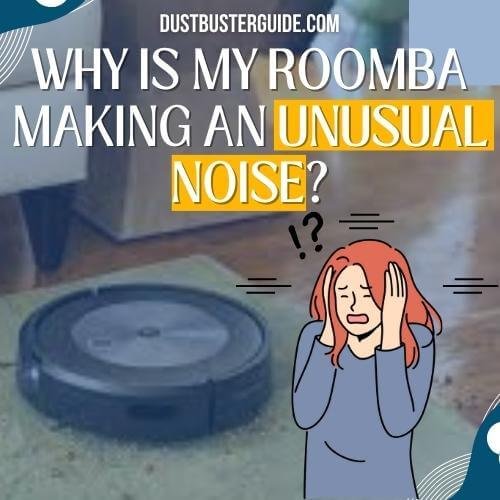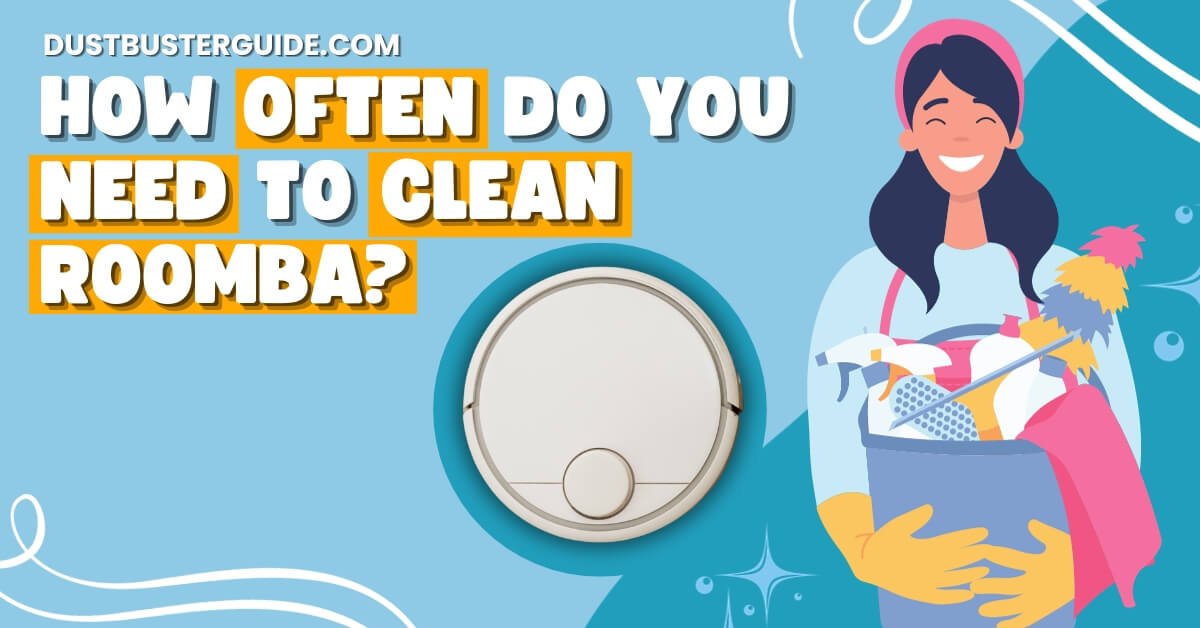The maintenance waltz of your Roomba prompts a question of upkeep: how often do you need to clean Roomba? It’s an exploration into the frequency required to ensure your diligent cleaning companion continues to perform at its best.
Picture this: your Roomba completing cleaning duties, and the question arises. In just a couple of lines, the answer pirouettes is like a maintenance revelation: Cleaning Roomba’s brushes, filter, and sensors every 1-2 weeks, depending on usage, helps maintain optimal performance. But before you assume it’s a demanding routine, join us on this exploration.
We’ll guide you through the steps to keep your Roomba in top cleaning form with minimal effort.
What Is The Importance Of Regular Cleaning
Regular cleaning of your Roomba is crucial to ensure its optimal performance and longevity. Just like any other cleaning tool, your Roomba needs regular maintenance to keep it in top shape. By understanding the importance of regular cleaning, you can ensure that your Roomba stays efficient and effective in keeping your floors clean.
First and foremost, regular cleaning helps to prevent clogs and blockages. As your Roomba moves around your home, it collects dust, dirt, and debris from your floors. Over time, these particles can accumulate and clog the brushes and filters of your Roomba. By regularly cleaning your Roomba, you can remove any trapped debris and prevent clogs, allowing it to continue cleaning effectively.
Additionally, regular cleaning helps to maintain the suction power of your Roomba. The brushes and filters of your Roomba play a crucial role in picking up dirt and dust from your floors. If these components are clogged or dirty, the suction power of your Roomba may decrease, resulting in less effective cleaning. By cleaning the brushes and filters regularly, you can ensure that your Roomba maintains its maximum suction power, keeping your floors spotless.
Furthermore, regular cleaning promotes the overall longevity of your Roomba. When your Roomba is clogged or dirty, it has to work harder to clean your floors, putting additional strain on its motor and other internal components. This can lead to premature wear and tear, reducing the lifespan of your Roomba. By regularly cleaning and maintaining your Roomba, you can extend its lifespan and save money in the long run.
Regular cleaning of your Roomba is essential to keep it running smoothly and efficiently. By preventing clogs and blockages, maintaining suction power, and promoting its longevity, you can ensure that your Roomba continues to clean your floors effectively for years to come. So, make it a habit to clean your Roomba regularly and enjoy the convenience of a clean and tidy home.

How Often Do You Need To Clean Roomba – Factors Affecting The Frequency
How often do you need to clean your Roomba? This is a question that many owners of this handy cleaning device often ask. While the answer may vary depending on factors such as usage and environment, regular cleaning is essential to keep your Roomba running efficiently and effectively.
One factor that affects how often you’ll need to clean your Roomba is the amount of dirt and pet hair in your home. If you have multiple pets or live in an area with heavy foot traffic, your Roomba may accumulate more dirt and hair, requiring more frequent cleaning.
Pets, especially those with long hair, tend to shed frequently, and their fur can easily get tangled in the brushes and wheels of your Roomba. Additionally, if you have children or frequently entertain guests, there may be more dirt and debris on your floors, which can also impact the frequency of cleaning.
Another factor to consider is the size of your home. If you have a large home with multiple rooms, your Roomba will be cleaning more surface area and therefore may need to be cleaned more often. The more your Roomba works, the more dirt and debris it will pick up, which can clog its filters and brushes. On the other hand, if you have a small apartment or only use your Roomba in specific areas, it may not accumulate as much dirt and can go longer between cleanings.
Below we have mentioned some of the pros and cons of Roomba cleaning frequency based on Home Size.
The type of flooring in your home is also an important factor. Different types of flooring can attract different amounts of dirt and debris. For example, carpets tend to trap more dirt and particles compared to hardwood or tile floors. If your home has a combination of carpeted and non-carpeted areas, your Roomba may need to be cleaned more frequently to effectively clean both types of flooring. Additionally, if you have rugs or mats that tend to shed fibers or have a high pile, these can also contribute to more frequent cleanings.
The frequency of cleaning your Roomba depends on several factors. The amount of dirt and pet hair in your home, the size of your home, and the type of flooring you have all play a role in how often you’ll need to clean your Roomba.
By regularly monitoring the condition of your Roomba and performing routine maintenance, you can ensure that it continues to clean effectively and efficiently. Remember to check the brushes, filters, and wheels regularly, and clean them as needed to keep your Roomba in top shape.
How To Establishing A Cleaning Routine For Your Roomba
Here are some key points to keep in mind when establishing a cleaning routine for your Roomba:
- Pet hair and debris: If you have pets or frequently track in dirt and debris from outside, your Roomba may need to be cleaned more often. Pet hair and debris can quickly accumulate in the brushes and wheels of your Roomba, affecting its ability to pick up dirt and navigate your home. Regularly checking and cleaning these areas will ensure optimal performance.
- Frequency of use: The more often you use your Roomba, the more frequently it may need to be cleaned. If you run your Roomba daily, it’s recommended to clean it at least once a week. However, if you only use your Roomba occasionally, you may be able to clean it less frequently. Pay attention to how much dirt and debris it collects during each use to determine the appropriate cleaning schedule.
- Type of flooring: The type of flooring in your home can also impact how often you need to clean your Roomba. If you have a lot of carpeted areas, your Roomba may need more frequent cleaning to remove dirt and dust that can get trapped in the fibers. Hardwood or tile floors may require less frequent cleaning, but it’s still important to regularly maintain your Roomba to ensure optimal performance.
Establishing a cleaning routine for your Roomba is essential to maintaining its performance and keeping your home clean. By considering factors such as pet hair and debris, frequency of use, and the type of flooring in your home, you can determine how often you need to clean your Roomba. Remember to regularly check and clean the brushes and wheels to ensure optimal performance and longevity of your Roomba. With a consistent cleaning routine, your Roomba will continue to help keep your home clean and tidy.
Tips For Efficient And Effective Cleaning
For optimal cleaning results with your Roomba, it’s crucial to follow these tips to efficiently and effectively maintain its performance. Cleaning your Roomba regularly not only ensures that it continues to clean effectively but also extends its lifespan. Here are some tips to help you clean your Roomba efficiently and effectively:
- Clean the brushes and extractors: The brushes and extractors on your Roomba can easily get tangled with hair, dust, and debris. Regularly removing and cleaning these parts will help maintain optimal cleaning performance. Use the cleaning tool provided with your Roomba to remove any tangled hair or debris. You can also use compressed air or a small brush to remove stubborn dirt. Cleaning the brushes and extractors every 1-2 weeks is recommended.
- Empty the dustbin: The dustbin on your Roomba collects all the dirt and debris it picks up while cleaning. It’s important to empty the dustbin after every cleaning cycle to ensure maximum cleaning efficiency. A full dustbin can hinder the Roomba’s ability to pick up dirt and may even cause it to stop cleaning altogether. Make it a habit to check and empty the dustbin regularly.
- Clean the sensors: Roomba’s sensors play a crucial role in navigating your home and avoiding obstacles. Over time, these sensors can get dirty and affect the Roomba’s ability to clean efficiently. Use a soft, dry cloth to clean the sensors on the top and bottom of your Roomba. Ensuring that the sensors are clean will help your Roomba navigate your home effectively and avoid unnecessary bumps or falls.
To make it easier for you to keep track of your Roomba cleaning routine, here’s a simple table to help you stay organized:
| Cleaning Task | Frequency |
| Brush and Extractor Cleaning | Every 1-2 weeks |
| Dustbin Emptying | After every cleaning cycle |
| Sensor Cleaning | Every 2-4 weeks |
By following these tips and maintaining a regular cleaning routine, you can ensure that your Roomba continues to clean efficiently and effectively. Remember, a clean Roomba is a happy Roomba!
Which Signs Tell Your Roomba Needs Cleaning
In the previous subtopic, we discussed some tips for efficient and effective cleaning with your Roomba. Now, let’s talk about an important aspect of maintaining your Roomba’s performance: knowing when it needs cleaning. Just like any other machine, your Roomba requires regular maintenance to keep it running smoothly. By being aware of the signs that your Roomba needs cleaning, you can ensure that it continues to function at its best and prolong its lifespan.
Firstly, one of the most obvious signs that your Roomba needs cleaning is a decrease in its cleaning performance. If you notice that your Roomba isn’t picking up as much dirt and debris as it used to, it’s a clear indication that it’s time to clean it. Over time, dirt, dust, and hair can accumulate in the brushes, wheels, and filters, which can hinder the Roomba’s ability to clean effectively. By regularly checking and cleaning these components, you can maintain the Roomba’s suction power and ensure that it does its job efficiently.
Another sign that your Roomba needs cleaning is an unpleasant odor coming from the device. When dirt and debris accumulate inside the Roomba, it can start to produce a musty smell. This odor can be particularly noticeable when the Roomba is in use or when you empty the dustbin. To eliminate the odor and improve the overall cleanliness of your Roomba, it’s important to clean the brushes, wheels, and filters regularly. By doing so, you can prevent the buildup of dirt and bacteria, ensuring that your Roomba remains fresh and odor-free.

Lastly, if you notice that your Roomba is making more noise than usual, it’s a sign that it needs cleaning. Dirt and debris can get trapped in the brushes and wheels, causing them to become less efficient and create additional friction. This can result in a louder operating noise. By cleaning the brushes and wheels regularly, you can reduce the noise level and maintain the Roomba’s smooth operation. Additionally, cleaning the filters will also help prevent clogs and ensure proper airflow, which can contribute to a quieter Roomba.
By being attentive to these signs, you can determine when your Roomba needs cleaning and take the necessary steps to maintain its performance. Regularly cleaning the brushes, wheels, and filters will not only improve the Roomba’s cleaning efficiency but also extend its lifespan. So, keep an eye out for any decrease in performance, unpleasant odors, or unusual noise, and give your Roomba the cleaning it deserves to keep your floors spotless.
What Is The Life Expectancy Of A Roomba
The life expectancy of a Roomba can vary based on factors such as maintenance, usage, and model. According to iRobot, the manufacturer of Roomba, the average lifespan of a Roomba is about 2 to 5 years.
However, with proper care, regular maintenance, and part replacements when necessary, some users have reported their Roombas lasting almost a decade or more.
The battery life of a Roomba typically averages about 2 to 3 years, and regular use and proper charging habits can help maintain the battery’s longevity.
Additionally, the lifespan of a Roomba can be influenced by the model and its quality, with higher-end models potentially lasting longer with proper maintenance and care. Therefore, while the average lifespan of a Roomba is about 2 to 5 years, it is possible to extend its longevity with attentive maintenance and care.
Conclusion
So now you know how often do you need to clean Roomba. Regular cleaning is essential to maintain your Roomba’s performance and longevity. Follow a simple routine, like cleaning brushes and filters, wiping sensors, and keeping the charging area clear. Establish a cleaning schedule, adjust it as needed, and pay attention to signs of dirt buildup. This upkeep ensures your Roomba continues to keep your floors clean and efficient.
FAQs
Can I clean my Roomba with water?
Yes, you can clean your Roomba with water. It is safe to use water to clean the brushes, filter, and dustbin. However, you should avoid submerging the entire robot in water.
How often should I replace the filters in my Roomba?
How often should you replace Roomba filters? Regularly replacing the filters in your Roomba is important for optimal performance. Aim to replace them every 2-3 months, or more frequently if you have pets or allergies.
Can I use harsh cleaning chemicals on my Roomba?
No, you should avoid using harsh cleaning chemicals on your Roomba. The chemicals can damage the robot’s components and affect its performance. Stick to mild, Roomba-approved cleaning solutions for optimal results.
Is it necessary to clean the sensors on my Roomba regularly?
Yes, it is necessary to clean the sensors on your Roomba regularly. Dust and debris can accumulate on the sensors, which can affect the robot’s performance. Regular cleaning ensures optimal functionality and helps maintain efficient cleaning.
Are robot cleaners worth it?
The decision of whether a robot vacuum is worth it depends on individual cleaning preferences and needs. Some users find them beneficial for daily maintenance, especially in homes with pets, children, or high allergen levels. However, traditional vacuums may still be necessary for deep cleaning and handling larger debris and tougher messes.
Is it ok to run Roomba daily?
Running a Roomba daily is generally considered safe and can help maintain clean floors, especially in homes with high foot traffic, pets, or allergy concerns. However, the frequency of use ultimately depends on individual cleaning needs and preferences.
External Resources
- Suck Up The Mess: The Benefits Of Using A Car Vacuum Cleaner – 91Wheels
- Design And Development Of A Low Cost Handheld Vacuum Cleaner – ResearchGate
- Assessment Of Vacuum Cleaners And Vacuum Cleaner Bags Recommended For Allergic Subjects – ScienceDirect
- Microbial Contents Of Vacuum Cleaner Bag Dust And Emitted Bioaerosols And Their Implications For Human Exposure Indoors – ASM Journal Platform

